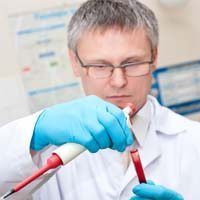Cancer Biomarker Test Could Detect Mesothelioma Earlier
 A new cancer biomarker test that promises to identify cancer in patients with “non-specific symptoms” could be the key to detecting mesothelioma earlier.
A new cancer biomarker test that promises to identify cancer in patients with “non-specific symptoms” could be the key to detecting mesothelioma earlier.
Malignant mesothelioma is a deadly cancer caused by asbestos. The early symptoms of mesothelioma are usually vague and similar to other conditions. As a result, mesothelioma is frequently diagnosed in a late stage.
But a cancer biomarker test developed in the UK could change that. The test looks for small molecules called metabolites in the blood. Its developers say it has the potential to find cancer earlier than other blood-based cancer tests.
Non-Specific Symptoms Make Mesothelioma a Diagnostic Challenge
Mesothelioma is a rare cancer. It is most common in people who worked or lived around asbestos in the past. Mesothelioma can take decades to develop. By the time people start experiencing symptoms, they may not make the connection with asbestos.
Early symptoms of pleural mesothelioma include coughing, fatigue, and shortness of breath. People with peritoneal mesothelioma may experience stomach pain, bloating, and fatigue.
Mesothelioma is so rare that many doctors have never even seen a case. Without a cancer biomarker test, the doctor may assume the patient has a chest cold or digestive problem. This leads to a “wait and see” approach that may waste valuable treatment time.
How a Cancer Biomarker Test Could Change Things
The new test uses magnetic resonance spectroscopy to find metabolites in the blood. Metabolites are substances formed through metabolism. People with mesothelioma or another type of cancer have a different metabolic profile from healthy people.
Dr. James Larkin, a medical oncologist at Oxford University, helped conduct a study of the new cancer biomarker test. The study included 300 patients with symptoms similar to people with early mesothelioma. Patients complained of non-specific problems such as weight loss and fatigue.
The researchers found that the test correctly detected cancer in 19 out of every 20 people with cancer. It was also 94 percent accurate at distinguishing between people with localized or metastatic (spread from another area) cancer.
Next Steps Toward Earlier Mesothelioma Detection
The new test is not able to identify a specific cancer such as mesothelioma. But, in an interview with The Guardian newspaper, Dr. Larkin said the test will help doctors know which patients should be referred for further testing.
“The moment you can say ‘you have a cancer’, it provides a strong incentive to send that patient for an imaging investigation to see if you can find that cancer,” Larkin said.
Another diagnostic test still in development looks for bits of cancer DNA in the blood. But the new cancer biomarker test could potentially find mesothelioma even earlier. Metabolic changes are some of the earliest changes to happen in patients with mesothelioma.
Dr. Larkin hopes to confirm the efficacy of the new test in a larger group of 2,000 to 3,000 patients within the next two years.
Source:
Larkin, et al, “Blood test could help detect cancer in people with nonspecific symptoms”, January 4, 2022, Clinical Cancer Research, Online ahead of print, https://clincancerres.aacrjournals.org/content/early/2021/12/16/1078-0432.CCR-21-2855





